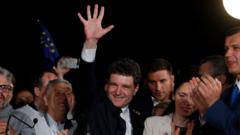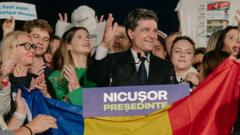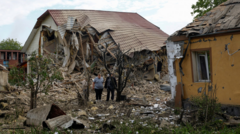In a significant escalation of its sanctions campaign against Russia, the European Union (E.U.) has approved a new package targeting covert oil exports, particularly focusing on older tanker vessels used for the clandestine transport of oil. This announcement came shortly after the top E.U. official unveiled plans for even stricter measures in the future. The primary goal of these sanctions is to inflict economic pressure on President Vladimir Putin’s administration, compelling a shift toward peace negotiations related to the protracted conflict in Ukraine.
**E.U. Intensifies Sanctions on Russia in Bid for Peace Talks**

**E.U. Intensifies Sanctions on Russia in Bid for Peace Talks**
The European Union escalates sanctions against Russia's oil exports as a strategic move to encourage negotiations regarding the ongoing war in Ukraine.
The new sanctions mark the E.U.'s 17th set since Russia launched its full-scale invasion in 2022. Among the strategies, officials are reportedly considering a possible 18th package. Ursula von der Leyen, the president of the European Commission, mentioned plans to potentially target gas pipelines and financial institutions to further constrain Russia's energy sales. Kaja Kallas, the E.U.'s leading diplomat, emphasized the necessity of increased pressure on Russia, stating, “It takes two to want peace, and it takes only one to want war.” This statement reflects the E.U.'s determination to influence Russia’s stance in ongoing negotiations.
Amid these developments, uncertainty looms over the United States' future stance on sanctions. Recent discussions between President Trump and Putin have led to a divergence in U.S. policy, raising questions about potential coordination with E.U. efforts to enhance penalties on Russia. Ukrainian President Volodymyr Zelensky expressed apprehension about whether the U.S. would align with Europe in its sanctions escalation.
As the international community remains vigilant regarding these developments, the effectiveness of the E.U.’s sanctions in achieving a diplomatic resolution to the conflict remains to be seen.
Amid these developments, uncertainty looms over the United States' future stance on sanctions. Recent discussions between President Trump and Putin have led to a divergence in U.S. policy, raising questions about potential coordination with E.U. efforts to enhance penalties on Russia. Ukrainian President Volodymyr Zelensky expressed apprehension about whether the U.S. would align with Europe in its sanctions escalation.
As the international community remains vigilant regarding these developments, the effectiveness of the E.U.’s sanctions in achieving a diplomatic resolution to the conflict remains to be seen.





















